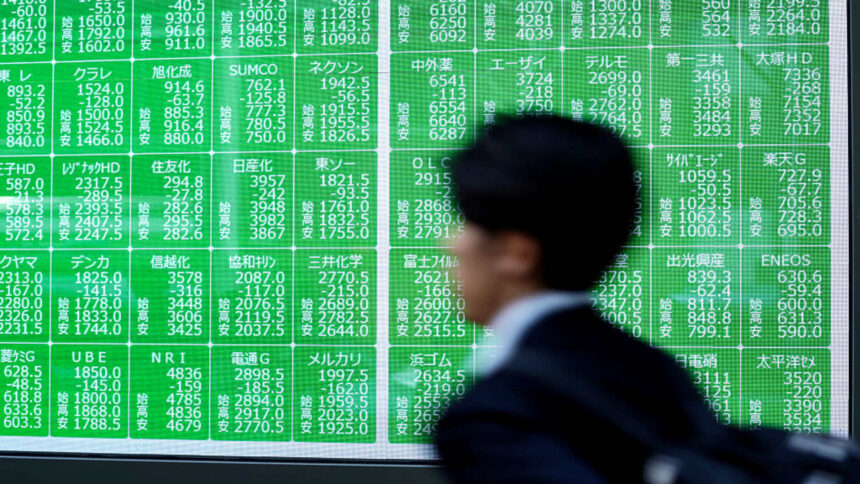A man walks along an electronic plate with the Nikkei 225 index on the Tokyo Stock Exchange along a street in Tokyo on April 7, 2025.
Kazuhiro Nogi | AFP | Getty images
Japan saw a foreign inflow into his shares and long -term bonds in April while investors pick up the American markets, follows after the trade of President Donald Trump, except against friends and enemies.
Overseas investors bought 8.21 trillion yen ($ 56.6 billion) in shares and long -term bonds in April, according to government data. The net inflows were the largest for a calendar month since the Japanese Financial Ministry began to collect data in 1996, according to Morningstar.
“Trump rate shocks have probably changed the prospects of global investors on the American economy and asset performance, which probably led to diversification away from the US to Oher Major Markets, including Japan,” said Yujiro Goto, head of the FX strategy of Nomura in Japan.
Now, with the US who soften its traces of and striking deals, including with China, the Confides is restored to American assets. So what does that do for Japanese assets?
It was remoate month annually, when you consider that everything has had in the global macro -economic environment.
Boulder okamura
Neuberger Berman
Most of the 8.21 trillion Yen Netto intake also took place in the first week immediately after 2 April, according to the data from the ministry.
Following Trump, announcement “reciprocal” rates, the American 10-year-old treasury was enriched with 30 basic points (3 to 9 April), while the 10-year return of Japan fell 21 basic points (2 to 8 April).
While Equisies Globalla saw a sale in the immediate aftermath of Trump Tarifs, the Japanese Nikkei 225 rose more than 1%for the full mouth, Compart S&P 500Who fell by slightly less than 1%.
Japanese assets are generally considered a port, whose profession rose as the “sales use” story in April gained ground, said Rashmi Garg, senior portfolio manager at the Dhabi Capital.
The inflow was largely powered by institutional investors, rather retail investors, said Nomura’s Goto. Pension funds and other asset managers probably bought aggressive shares, while Japanese bond purchases were largely powered by reserve managers, life insurers and also pension funds, according to Nomura.
“It was removed from the exceptional month, when you are considering every day that had in the global economic macro -economic envy,” says Kei Okamura, Neuberger Berman’s MD and the portfolio manager of the Japanese shares.
“That clearly had an impact in the way worldwide investors thought about the allocation of assets towards the US … they had to diversify,” I have AWD CNBC in a phone call.
The way for us
Garg from Al Dhabi Capital expects the inflow to slow down, given the breakthrough in tariff discussions in the US and China, and also as deals with other countries are likely. Great -Britain In fact the first country to have a deal with the US ink last week.
Although historical monthly intake may not take place, market guards still have a positive view of Japanese assets and continue to see to see strong intake.
The unprecedented actions of Trump and Policy Flops have retained the credibility of the US and confidence in its assets, and this can still lead to the fact that global fund managers invest less in the American markets in favor of others, explained Vasu Menon, director of OCBC, director of the investment strategy team.
“Given this background, the demand for Japanese assets can remain healthy, even if it is not as strong as the level of April,” he said. Japan’s constant conversations with the US with scarfs to rates have also activated optimism about lowering the 24% “mutual” rates for Japan, Menon said.
Japanese shares will also benefit from the reforms of the business government of Tokyo Stock Exchange, which has given you priority to the shareholders’ returns, Asset Management One International wrote in Note.
The reforms of the TSE Corporate Government, which started Kickstart in March 2023, justify listed companies that shares under a price book ratio of one to ‘compile or explain’. The initiative is intended to the profession of Japan Inc. to stimulate Bush -Buitlandse and Domestic Investors.
This reform program has led to likely record levels of stock buying in Japan, which improves both profit per share and the support price, asset management said that an international.
Although the dollar has been recovered after the sale of April, it is potential that it is further weakened and the Japanese currency to be ” meaningful for investors to look at Japanese similarities, especially as the economy restores, Neuber Berman’s Berman’s Okamura said.
“So this trend has legs. Japan will probably continue to see good streams,” said Okamura.
Morningstar’s stock research analyst Michael Makdad sees more net entry into Japanese shares than in the past decade in the midst of the improved corporate governance.
That said, he does not see the same weight of the net influx in short-term Japanese treasury drawings as when the Bank or Japan implemented negative interests as the arbitration option for subsubsubs subsubsubstant investors that exist is no longer present.
